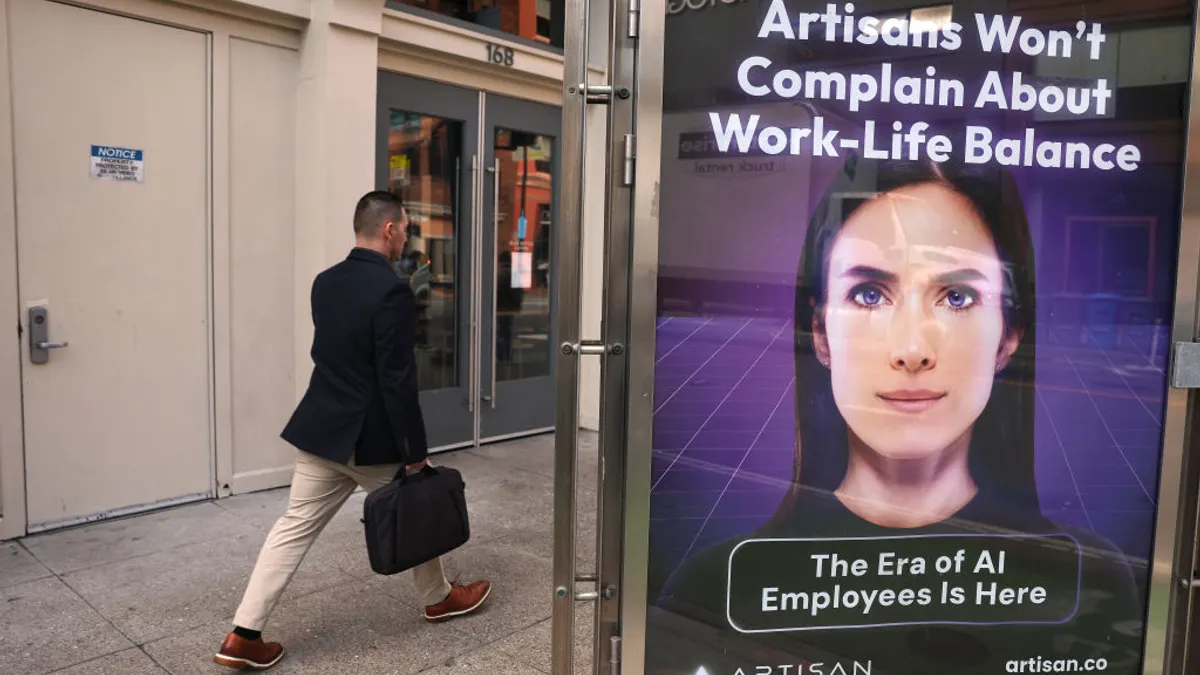Ask any recruiter what percentage of resumes cross their desk with at least one "fudge" of the truth, and the result will shock — unless, of course, you're a recruiter. Lies and exaggerations on resumes have become so commonplace that it’s hard to find one without embellishment.
Surveys abound outlining just how many resumes include some form of exaggeration: one in particular chalks the figure up to 85%. And those trying to pass off fibs aren't flying under the radar, either. Data from Robert Half revealed that nearly half (46%) of American workers know someone whose resume includes false information, up 25% from 2011 to 2017.
Most often inflated
Tammy Cohen, chief visionary officer and founder of InfoMart, tells HR Dive their internal data found "more than 13% of applicants exaggerated dates of employment — even when a 31-day buffer before and after was included to adjust for bad bookkeeping."
But it's also common to see the exaggeration of expertise, said Brett Good, senior district president for Robert Half. "Vague descriptions of skills such as 'familiar with' or 'involved in' may be signs that a job seeker is trying to downplay a lack of direct experience," Good said, adding that large gaps in employment or listing positions without months (only years) can be a red flag.
"Think about the way people are wording things," suggested Emily Parra, HR practice leader at StratEx. "Unfortunately it's commonplace for everyone to exaggerate a bit — or to tailor what they've done to make it look as though they have the experience you’re looking for."
Parra believes that taking a bit more time to look at resumes helps reveal some of the overhyped elements, like titles and companies that don't ring a bell or lavish terms for what appears to be simple work.
Why lie?
Some put the blame for fibs on bots, more specifically applicant screening platforms that weed out candidates who don't meet minimum requirements or whose resumes don't highlight the right keywords. The prospect of seeing only qualified candidates is irresistible for recruiters, but who could have anticipated a quick search for "how to beat resume scanning software" would yield over half a million results? Clearly, job candidate lifehacks are getting closer to beating headhunters at their own game.
Cohen tells HR Dive that AI is partly to blame for an abundance of exaggerations on resumes regarding skills and abilities. “Job seekers understand the importance of keywords," she said, "and [they] carefully align themselves with a position based on keywords." But the problem can start before the posting hits the web.
"Job descriptions built with artificial intelligence create the corresponding job posts which become the catalyst for keyword embellishments," says Cohen. These keywords established by the employer's job description ultimately become the criteria upon which resumes will be searched and scored. "To our own detriment," she says, "when trying to glorify a position to attract a better candidate, we inflate our pipeline with resumes exaggerated to meet the requirements of the position."
On the flip side of the coin, candidates may feel emboldened by the thought there may not be a fact-checking process at all. A recent survey uncovered 46% of hiring managers don’t bother to check reference information. For candidates, it can be almost even odds you won’t get caught.
What to do
Cohen recommends going back to basics to see through exaggerations. Recruiters should use their interview savvy to dive deep into work experience, asking for situational examples to back their experience claims. "The use of multiple follow-up questions often will expose the truth," she said.
While not all the resume information may be 100% true, it may be more important to focus on what you need and see if that's included. If someone has the majority of what you're looking for but has fudged a bit on something irrelevant, it might be worth overlooking, Parra said.
It's important to understand the mentality of "getting yourself seen. Often the biggest things people exaggerate might not be the most important to you," she said. What you really seek in terms of experience may not be listed on the job description or the resume.
Hedging your bets
HR should consider updating job descriptions, even if there's an AI product in place, to assure the included keywords actually speak to what the employer needs. Rather than having screening platforms weed out individuals for non-critical information, try to refocus on things that make for a great candidate and new hire.
Organizations can add skills testing during the process to help identify whether a candidate has the competency needed for the role, Good said. Background checks are critical: even more so than they ever were before. It’s a mistake to take everything at face value.
"Employers often search a candidate's history online, but it doesn't always tell the full picture," Good added, warning about situations in which the candidate's name could lead to completely different people with the same name. As far as trolling an applicant's social and professional networks, tread lightly: you might find information you shouldn't access.
Screening calls are also valuable resources: they can give you a snapshot into the person's qualifications. If you see something on a candidate's resume that looks questionable, ask them to elaborate. If they can't, you may have found a fib.
Parra suggests arming hiring managers to help them hone in on talent. So many managers ask for more training, but few get it when it comes to interviewing skills. Sit in with new managers for their first few interview sessions, or train them to use behavioral questions to delve deep into a candidate’s qualifications.
Deal breakers
While some exaggerations can be put down to human error (if you’re being generous), others should be deal breakers. Lying about a degree or education, or even specific positions held should have you questioning a candidate's integrity.
Evasiveness about gaps in employment or reasons for leaving could be caught by a background check, but you may have to weigh what you find against the applicant's willingness to be honest. The value of thorough vetting to assure a good, non-negligent hire cannot be overstressed.
In the future, blockchain could rid the applicant pool of resume lies, but in the meantime, recruiters will have to rely on their interview skills and a good background check to make sure new hires are who they said they were.



















